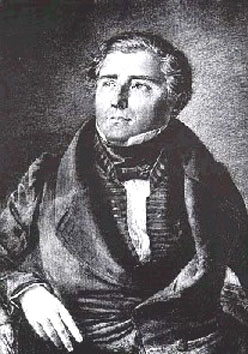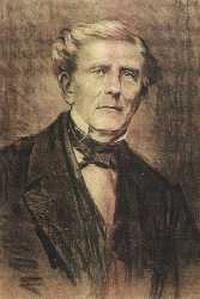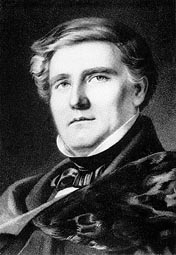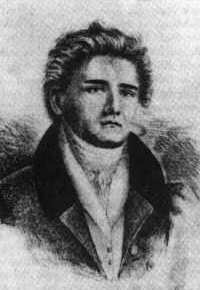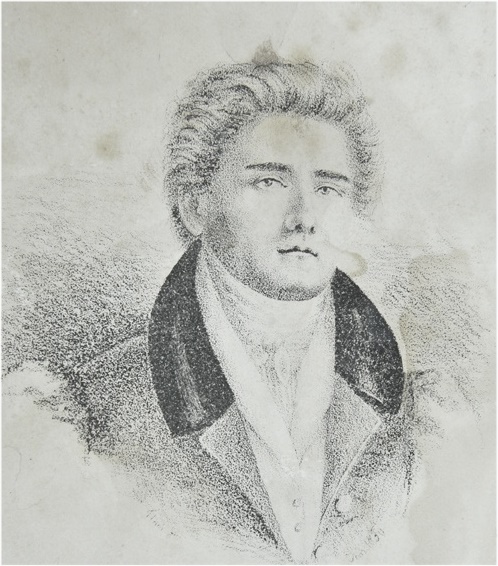Carl Loewe
Johann Carl Gottfried Loewe ( born November 30, 1796 in Löbejün, † April 20, 1869 in Kiel ) was a German composer.
Life
Carl Loewe was born the twelfth child of the cantor and organist Andreas Loewe and his wife Marie. From his parents he received a musically influenced early education. During his early school years in Köthen he sang from 1807 to 1809 in Köthen boys' choir, and then changed thanks to a grant of King Jérôme Bonaparte on the Latina of the Francke Foundations in Halle. During this time he took composition lessons with Daniel Gottlob Turk, for whom he appeared as a soprano singer in Stadtsingechor to Hall and as soloist at concerts. Musically, he was promoted on the recommendation of his teacher by Johann Friedrich Reichardt, who lived in Giebichenstein near Halle.
Since Loewe 1816 Our Lady could not prevail against its competitors Johann Friedrich Naue in his application for the post of organist at the Market Church, he enrolled the same a year later, after completion of the final examination, a student of Protestant theology at the University of Halle one. In the public musical life Halles Loewe proven to be an excellent tenor in performances of the Singing Academy under the direction Johann Friedrich naues and many other occasions. In the Halle years he wrote nearly fifty compositions, ballads like Erlkönig and Edward.
After studying Loewe in 1820 in Berlin by Carl Friedrich Zelter was checked carefully for its ability to church and school musicians. He passed with honors and was in Szczecin cantor and organist at the Church of St. James. Here Loewe was also for 46 years working as a secondary school teacher and Director of Music. He founded the Pomeranian Choral Association and held in the name of numerous music festivals. A close friend he was with Justus Günther Grassmann, his son Hermann Grassmann, and the poet Ludwig Giese Brecht, whose texts he set.
Loewe had in his time a reputation as a conductor, pianist and as a concert singer. He became an honorary doctorate from the University of Greifswald in 1837 and member of the Berlin Academy of Arts. In 1857 he resigned the leadership of the music festivals.
On 16 Sept. 1821 he married in Halle / Saale Julia from Jacob. She was a daughter of the Halle University Chancellor Ludwig Heinrich von Jakob and his wife. Julia Loewe died in 1823 after the birth of their son Julian, who was brought up by relatives. 1825 Loewe married Auguste Lange. From this marriage produced four daughters. In 1829, Carl Loewe was included in the covenant of the Freemasons, his box to the three circles was established in Szczecin. He composed in his singing quartets, among others a composition for Freemasons.
After he had recovered from a severe stroke in 1864, he had to resign in 1866 by invitation of the Szczecin City Council. He spent his final years at his eldest daughter Julie - a married Bothwell - in Kiel. This was trying to get the works of her father's posterity.
His tomb is located on the Park Cemetery Eichhof near Kiel. In addition, plaques recall in the Nikolai Church in Kiel and Stettin Jakobi church where his heart is buried in a capsule in one of the two organ pillars at him. In Düsternbrooker wood in Kiel there is a bust Loewe.
1938 Karl -Leo- lane facility in Vienna was named after the composer.
In Rhineland-Palatinate Unkel, where his widow had purchased a house for himself and two of her daughters in 1874, is since 1995 with the annual Carl Loewe Music Days remember him.
Works (Overview)
Carl Loewe's ballad, made famous as a special extended version of the solo song in the 19th century - as a composer and as a singer. Loewe has, six years before Robert Schumann, also the cycle of poems woman's love, and life from Adelbert von Chamisso set to music (1834 ). In the ballads of his ability the vivid description, the vivid musical imagery and haunting characterization of shapes, locations and operations best expressed. His range of subjects is far stretched. Besides the preferred areas of history, the legend and the tale he has created everyday and genre pictures, idylls and moral fables; Large stands next to small things, Simple addition fantastic, weird next - Playful humorous. Loewe also possessed a beautiful tenor voice and was considered eloquent, intense elocutionist.
Ballads
Among the best known of the 400 ballads include:
- 3 ballades op 1 ( Year 1824) Edward ( after Johann Gottfried Herder)
- The landlady 's daughter (after Ludwig Uhland )
- Erlkönig ( after Johann Wolfgang von Goethe )
- Mr. Oluf Op 2, No 2 (1821, Danish ballad, translation: Johann Gottfried Herder)
- 3 ballades op.20 (1832, by Johann Wolfgang von Goethe ): Wedding song
- The Sorcerer's Apprentice
- The changing bell
- Henry the Fowler, Op 56, No. 1 (1836, by Johann Nepomuk Vogl )
- The bells of Speyer ( 1838, after Maximilian von Oer )
- Prinz Eugen, the noble knight, Op 92 (1844, by Ferdinand Freiligrath )
- The monk of Pisa, Op 114 (1846, by Johann Nepomuk Vogl )
- Odin sea ride or the blacksmith on Helgoland, Op 118 (1851, by Aloys Schreiber )
- The clock ( from op 123, 1852, by Johann Gabriel Seidl )
- Archibald Douglas, Op 128 (1857, by Theodor Fontane )
- Tom the Rhymer. Scottish Ballade, Op 135a ( 1860 )
Other works
Monuments
Friends and admirers gathered in Szczecin for the erection of a monument, which was unveiled on November 30, 1898 next to the city Jacobi Church. The design was created by the sculptor Hans Glümer Weddo, in one of Gladbeck- foundries in Frederick Hagen, the statue was cast in bronze. The monument is missing. In his native city stands on the upper market a Carl Loewe bust of Löbejüner of porphyry. This is a copy (1947 ) of 1896 created by Fritz Schaper bust that had been melted down in 1942 as a metal donation. There is a plaque in Löbejün on Loewe's birthplace at the cemetery and a bust in Kiel.



